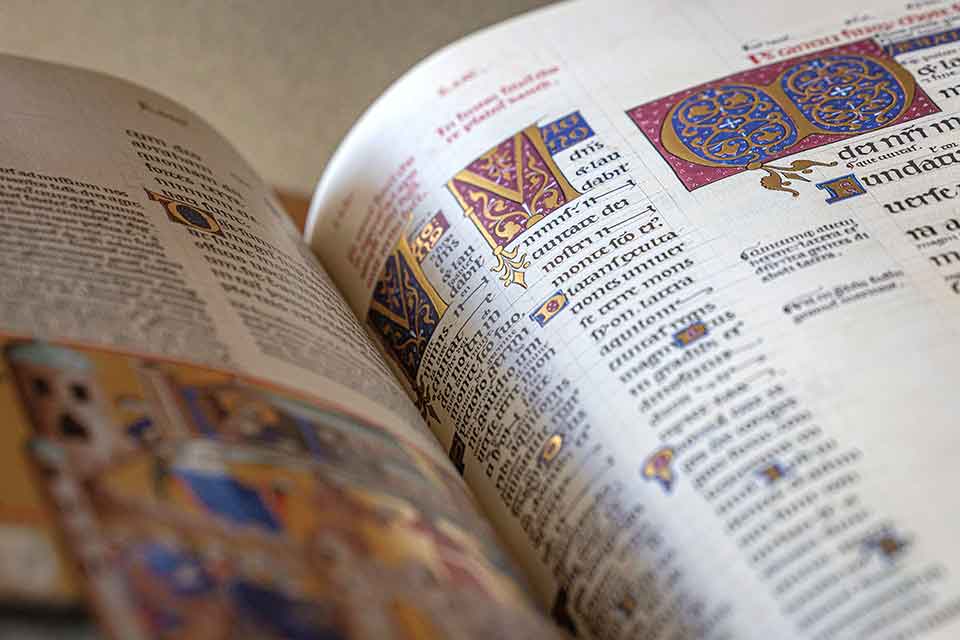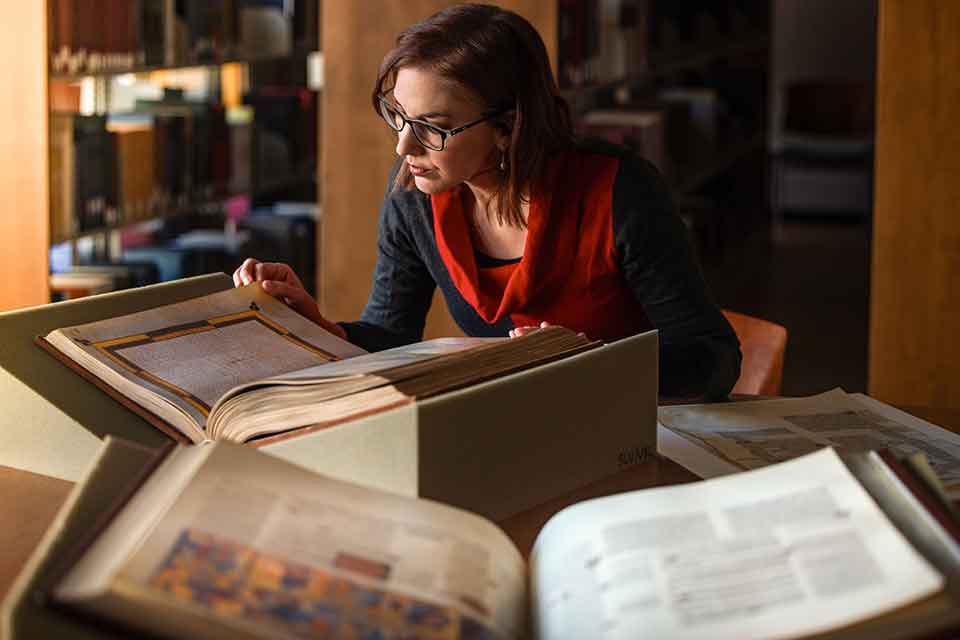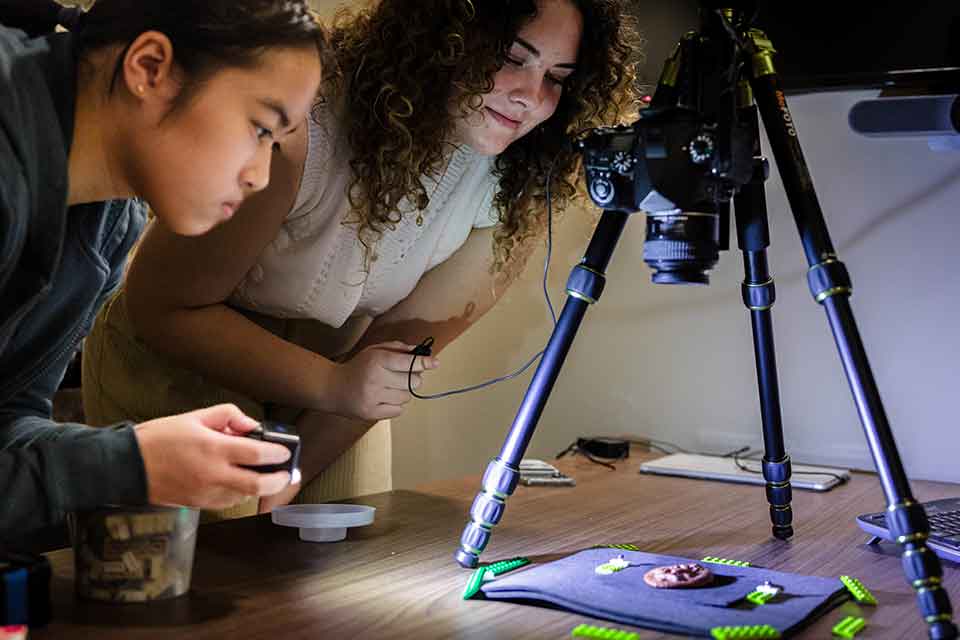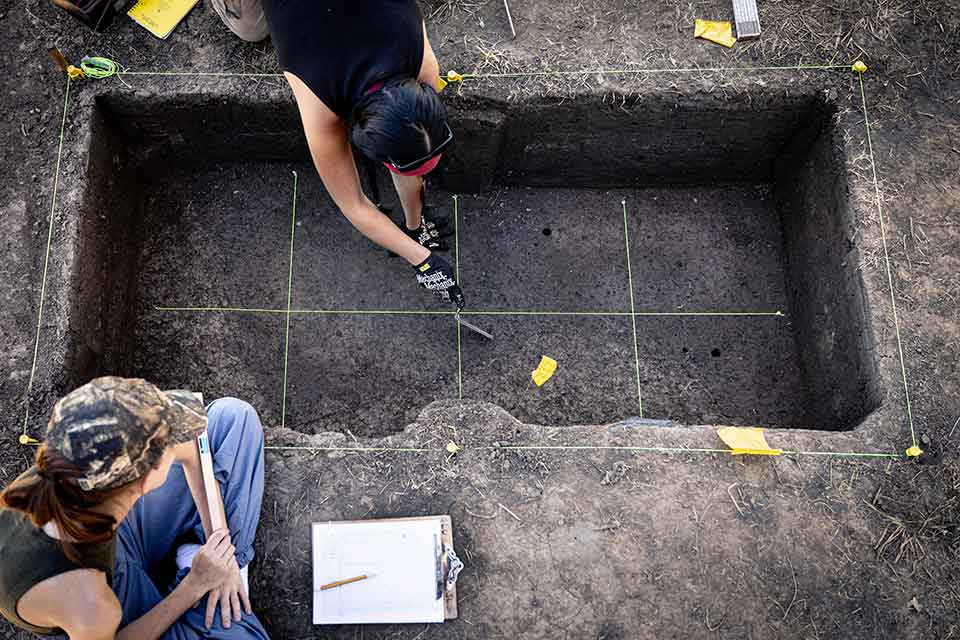Humanities Research
Saint Louis University follows the Jesuit tradition of caring for and educating the whole person — mind, body and spirit — and transforming the world into a better place. Humanistic inquiry can help make sense of the world and the richness of the human experience across different places and times.
Illuminating the Human Experience
Humanistic inquiry is a multidisciplinary and interdisciplinary approach that reaches across the humanities – English, history, languages, theology, and philosophy – as well as the arts and social sciences. Humanistic inquiry can help us make sense of the world and reveal the richness and complexity of shared human experiences across time. While scientists and engineers craft groundbreaking new treatments and technologies, humanists provide the framework by which we can understand how best to use them.
In 2024, SLU's College of Arts and Sciences launched the Collaborative for Humanistic Inquiry (CHI), composed of nine research centers, to investigate a range of topics, including the ethical dimensions of artificial intelligence and the role of religion in American public life. CHI includes the Center for Medieval and Renaissance Studies, which is among the largest in the nation. The center’s annual symposium draws more than 200 scholars and researchers from around the world to St. Louis.
Unique Collections and Resources
Researchers studying the human condition have access to tremendous internal resources, such as:
- The University Libraries, including specialized collections that house thousands of rare manuscripts
- The Saint Louis University Museum of Art (SLUMA), which displays unique collections and artifacts, some of which were unearthed from SLU researchers’ own excavations
- SLU manages partnerships with regional archives and humanities organizations, such as the Jesuit Archives and Research Center located just across the street from SLU’s St. Louis campus.
- The SLU Center for Research on Global Catholicism (CRGC) has built a network of researchers and archivists through the St. Louis Catholic Archives, which increases the visibility and accessibility of the collections of local Catholic archives.
Digital Humanities
SLU researchers apply new technologies and methodologies, some of which were developed on SLU’s campus, to advance our understanding of humanity.
- The Walter J. Ong, S.J. Center for Digital Humanities (OngCDH) serves as a hub for the digital humanities at SLU, connecting researchers with digital resources and providing guidance on how to use them. Researchers supported by the Center have mapped the legacy of systemic racism across St. Louis and used digital imaging technology to catalog medieval seals.
- The Transcription for Paleographical and Editorial Notation (T‑PEN) is a web-based tool that assists scholars by providing transcriptions of manuscripts and mapping them to the regions where they originated. T-PEN was first developed at SLU, and is now being revamped by SLU researchers such as Atria Larson, Ph.D.
Geospatial Humanities
As St. Louis emerges as a national hub for geospatial science and technology, SLU researchers are seizing the opportunity to apply geospatial methodology to better understand humanity’s past and present.
- The Culture, Religion, Ethics, Science and Technology (CREST) Center and the Taylor Geospatial Institute (TGI) Spatial Humanities Working Group, co-led by SLU’s Fabien Montcher, Ph.D., are bringing together geospatial scientists and humanists to make new historical and cultural insights using geospatial technology. These include mapping the movement of goods around the world and creating new models of ancient civilizations.
- The Lived Religion in the Digital Age project, co-led by Rachel Lindsey, Ph.D., and Pauline Lee, Ph.D., aims to digitally map the sights, sounds and spaces of religion in St. Louis using a mobile app with which users can collect images, videos and audio files from across the region. The resulting interactive maps provide a multisensory inventory of religion in public life and a broader understanding of what it is to be human together.
Driven by a Mission
Humanistic inquiry is a cornerstone of SLU’s research enterprise, and it is central to our Catholic, Jesuit mission. By critically examining our past and present, this research can chart a path toward a more just and equitable future.
- The Albert Gnaegi Center for Bioethics and the Department of Health Care Ethics bring SLU’s Catholic, Jesuit tradition into the interdisciplinary study of philosophical and theological bioethics. Faculty have received more than $2 million in research funding from government agencies and foundations, including grants from the National Institutes of Health (NIH) and SSM Health Care.
- The Center for Health Law Studies in the SLU School of Law has been a top-ranked program since U.S. News & World Report began ranking programs in the field. For more than 40 years, the center has promoted advocacy through research and scholarship. Students and faculty examine the laws, provisions, and policies that impact the relationship between health care providers and patients.
- The SLU/YouGov Poll is the only regular academic, nonpartisan scientific survey of Missouri voters. All results and data are made available online for researchers, policymakers, and the general public. By informing public discourse and helping government officials craft policies that reflect the interests of their constituents, the SLU/YouGov Poll supports the foundations of a healthy democracy.
Student Involvement
An appreciation for the human condition is the bedrock of Jesuit education. At SLU, it means training the next generation of researchers and scholars, equipping them with the skills to explore the world around them, as well as the discernment to ask big questions. Students play a vital role in many research projects:
- Students joined Thomas Finan, Ph.D., on an excavation of a castle in Ireland that shed new light on medieval siege strategies and Mary Vermilion, Ph.D., on an excavation at the site of one of North America’s great prehistoric civilizations just outside St. Louis.
- Students reviewed poll data and drafted analyses for the SLU/YouGov Poll.
- Students worked side-by-side with faculty researchers in the CREST Research Center’s Community of Scholars to apply geospatial insights to the impacts of climate change on underserved neighborhoods and to enhance sustainability in urban planning.
SLU empowers students to launch their own research projects, connecting them with the unique expertise and resources available at the University. In 2024, the Center for Iberian Historical Studies hosted a research seminar in Madrid, Spain, where graduate students were given access to unique international archives to support their research.





















